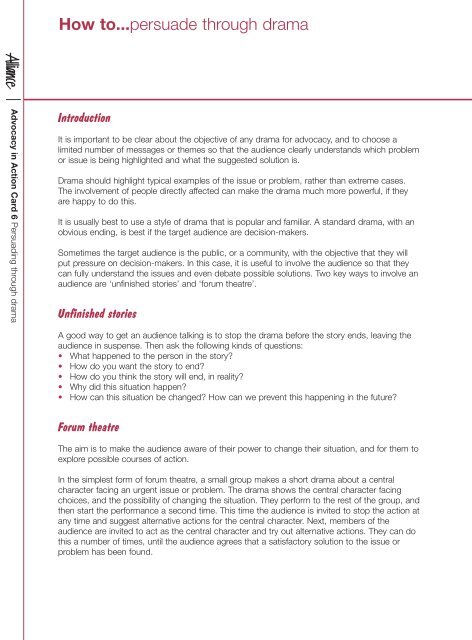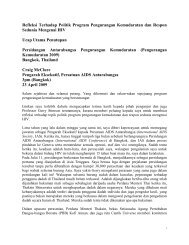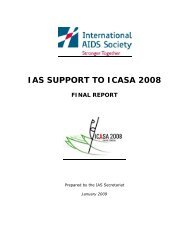Advocacy in Action - International AIDS Society
Advocacy in Action - International AIDS Society
Advocacy in Action - International AIDS Society
Create successful ePaper yourself
Turn your PDF publications into a flip-book with our unique Google optimized e-Paper software.
How to...persuade through drama<br />
<strong>Advocacy</strong> <strong>in</strong> <strong>Action</strong> Card 6 Persuad<strong>in</strong>g through drama<br />
Introduction<br />
It is important to be clear about the objective of any drama for advocacy, and to choose a<br />
limited number of messages or themes so that the audience clearly understands which problem<br />
or issue is be<strong>in</strong>g highlighted and what the suggested solution is.<br />
Drama should highlight typical examples of the issue or problem, rather than extreme cases.<br />
The <strong>in</strong>volvement of people directly affected can make the drama much more powerful, if they<br />
are happy to do this.<br />
It is usually best to use a style of drama that is popular and familiar. A standard drama, with an<br />
obvious end<strong>in</strong>g, is best if the target audience are decision-makers.<br />
Sometimes the target audience is the public, or a community, with the objective that they will<br />
put pressure on decision-makers. In this case, it is useful to <strong>in</strong>volve the audience so that they<br />
can fully understand the issues and even debate possible solutions. Two key ways to <strong>in</strong>volve an<br />
audience are ‘unf<strong>in</strong>ished stories’ and ‘forum theatre’.<br />
Unf<strong>in</strong>ished stories<br />
A good way to get an audience talk<strong>in</strong>g is to stop the drama before the story ends, leav<strong>in</strong>g the<br />
audience <strong>in</strong> suspense. Then ask the follow<strong>in</strong>g k<strong>in</strong>ds of questions:<br />
• What happened to the person <strong>in</strong> the story?<br />
• How do you want the story to end?<br />
• How do you th<strong>in</strong>k the story will end, <strong>in</strong> reality?<br />
• Why did this situation happen?<br />
• How can this situation be changed? How can we prevent this happen<strong>in</strong>g <strong>in</strong> the future?<br />
Forum theatre<br />
The aim is to make the audience aware of their power to change their situation, and for them to<br />
explore possible courses of action.<br />
In the simplest form of forum theatre, a small group makes a short drama about a central<br />
character fac<strong>in</strong>g an urgent issue or problem. The drama shows the central character fac<strong>in</strong>g<br />
choices, and the possibility of chang<strong>in</strong>g the situation. They perform to the rest of the group, and<br />
then start the performance a second time. This time the audience is <strong>in</strong>vited to stop the action at<br />
any time and suggest alternative actions for the central character. Next, members of the<br />
audience are <strong>in</strong>vited to act as the central character and try out alternative actions. They can do<br />
this a number of times, until the audience agrees that a satisfactory solution to the issue or<br />
problem has been found.
















